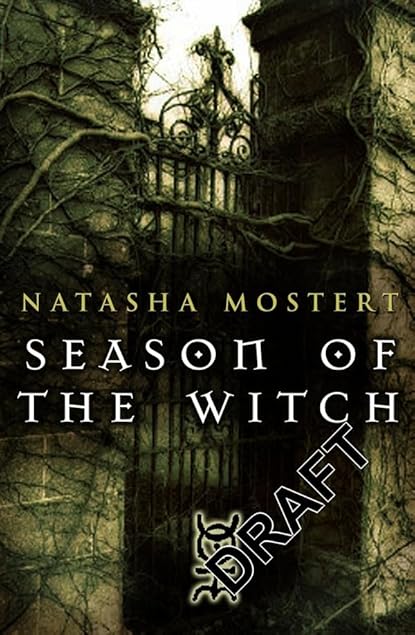I’ve been really enjoying looking back at some of my favourite books and this month I’m looking back at some I read in August in each of the years 2007 ‘“ 2010. Click on the titles to see my original reviews.
Looking back at these books makes me want to re-read each one. I was enthralled by them all:
2007
 There is so much I loved in Season of the Witch by Natasha Mostert, a thrilling, spine tingling story of mystery, mysticism and magic, abounding with symbolism. It’s a modern day gothic epic, mixing computer technology with witchcraft, alchemy and the power of the human mind, in the search for enlightenment.
There is so much I loved in Season of the Witch by Natasha Mostert, a thrilling, spine tingling story of mystery, mysticism and magic, abounding with symbolism. It’s a modern day gothic epic, mixing computer technology with witchcraft, alchemy and the power of the human mind, in the search for enlightenment.
I raced through the book with that nervous tension anticipating danger that you feel watching a horror film build up, leaving me breathless as I read.
Gabriel Blackstone is a computer hacker by trade, and by inclination he is a remote viewer; someone whose unique gifts enable him to ‘˜slam rides’ through the thought processes of others. He is contacted by an ex-lover who begs him to use his gift to find Ronnie, her stepson, last seen months earlier in the company of two sisters, Minnaloushe and Morrighan Monk (wonderful names). The beautiful and mysterious sisters are descendants of Dr John Dee, a mathematical genius, alchemist and secret adviser to Queen Elizabeth I. Both of them bewitch Gabriel as he seeks to unravel the mystery behind Robbie’s disappearance.
2008
August 2008 found me reading a completely different genre – Pompeii by Robert Harris is historical fiction. The story begins in August AD 79 just two days before the eruption of Mount Vesuvius and builds up to a climax. Whilst most people are blissfully unaware of what is about to be unleashed upon them one man ‘“ the engineer Marius Attilius Primus realises the danger when the aqueduct Aqua Augusta fails to supply water to the people in the nine towns around the Bay of Naples. Then Vesuvius erupts destroying the town of Pompeii and killing its inhabitants as they tried to flee the pumice, ash and searing heat and flames.
The book brought history to life and I could feel the danger and fear as Vesuvius inevitably destroyed Pompeii. I particularly liked mixture of fictional and historical characters and the inclusion of Pliny, then the Admiral of the Fleet, as he watched and recorded the progress of the eruption and the account of his death.
2009

As she thought about it ideas sprang to her mind ‘“ a first wife ‘“ jealousy, something terrible would happen ‘“ a wreck at sea. She became immersed in the story, losing herself in the plot, as so many of us have done ever since.
I enjoyed the other short pieces in this book ‘“ her ‘˜memories’ of her family and her own life and beliefs. Some are about her family, some about her childhood and some about the house she loved, Menabilly.
2010
Finally in August 2010 I read Thirteen Hours by Deon Meyer, one of the best books I read that year. I was engrossed in it right from the start. It’s tense, taut and utterly enthralling. Moving at a fast pace the book follows the events during the thirteen hours from 05:36 when Rachel, a young American girl is running for her life up the steep slope of Lion’s Head in Capetown.
The body of another American girl is found outside the Lutheran church in Long Street and an hour or so later Alexandra Barnard, a former singing star and an alcoholic, wakes from a drunken stupor to find the dead body of her husband, a record producer, lying on the floor opposite her and his pistol lying next to her.
Meyer is a fantastic story teller and creates such wonderful characters. DI Benny Griessel is mentoring two inexperienced detectives who are investigating these crimes. I grew very fond of Benny, who is also an alcoholic and struggling to keep his marriage together. The book also reflects the racial tension in the ‘˜new South Africa’ with its mix of white, coloured and black South Africans. There is a strong sense of location, not just from the cultural aspect but also geographical.


The Harris particularly appeals to me since I’m rapidly turning into a major fan of his stuff. The Deon Meyer sounds great too – a name I keep hearing but haven’t yet tried. Perhaps I’ll have to fit him in as part of my Around the World challenge. It’s fun looking back at old reads, isn’t it?
LikeLike
Pompeii was the first book of his that I read – and I’ve enjoyed all the others by Harris that I’ve read! Still haven’t read Enigma yet. Meyer is definitely an author to try – I also enjoyed his Blood Safari, although at times the environmental issues came over as lectures but that’s just a minor criticism.
LikeLike
I’m so glad you liked the Meyer, Margaret. I think he’s very, very talented. And the Harris is calling to me, as well. Oh, and that Du Maurier, too. Some great reads here!
LikeLike
A wonderful range of genres, Margaret. Thanks for the look back!
LikeLike
I found Pompeii terrific too–will probably reread it someday. I would like to read The Rebecca Notebook–I think Daphne du Maurier is one of the most innovative writers of her time, and her books, for the most part, hold up well.
LikeLike
These all sound great!
LikeLike